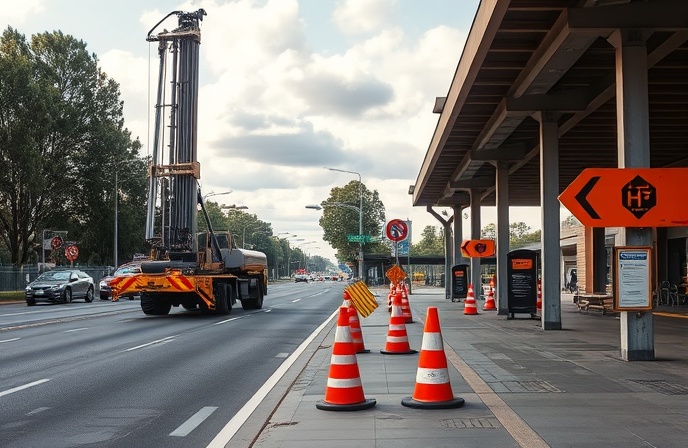Barcelona Airport: Alstom’s Coradia Stream Trains

This article explores the recent contract awarded to Alstom by Ferrocarrils de la Generalitat de Catalunya (FGC) for the supply and maintenance of ten new Coradia Stream trains. This project represents a significant investment in modernizing FGC’s rolling stock and enhancing passenger experience on the new airport connection line in Barcelona. The focus will be on the key features of these new trains, emphasizing their design considerations for airport travel, accessibility improvements, and technological advancements. We will also examine the broader context of this project within the larger framework of Barcelona’s transportation infrastructure development and Alstom’s role in supplying modern railway solutions globally. The article will delve into the technical specifications, passenger-centric design choices, and the long-term maintenance agreement, providing a comprehensive overview of this crucial rail development. Finally, we will consider the wider implications of such projects, including the impact on urban mobility, economic development, and environmental sustainability.
Coradia Stream Train Design for Enhanced Airport Connectivity
Alstom’s Coradia Stream trains, designed specifically for FGC’s airport link, prioritize passenger comfort and efficiency. Each five-car train boasts ten doors per side, facilitating rapid passenger boarding and alighting. The spacious interior accommodates up to 656 passengers, including 209 seats (202 fixed and 7 folding), significantly increasing passenger capacity compared to previous models. The incorporation of ample luggage storage addresses the specific needs of airport travelers. Furthermore, the integration of real-time flight information screens ensures a seamless travel experience by providing passengers with up-to-date arrival and departure information. This design prioritizes both passenger convenience and efficient passenger flow, crucial for an airport shuttle service.
Accessibility and Universal Design
Accessibility is a core tenet of the Coradia Stream’s design. Platform-level boarding eliminates steps, and automatic ramps at the doors near the designated area for passengers with reduced mobility (PRM) further enhance accessibility. Two dedicated spaces for PRM, adapted toilets, and multifunctional areas for bicycles and luggage trolleys underscore the commitment to inclusive design. Developed in collaboration with the ONCE Foundation, the design adheres to universal design principles, ensuring a positive travel experience for all passengers regardless of their abilities or needs. This focus on universal design underscores the commitment to providing equitable access to public transportation for all members of the community.
Technological Advancements and Passenger Information Systems
The Coradia Stream trains incorporate advanced technologies to enhance the passenger experience and operational efficiency. The integrated passenger information system features 20 screens for train-related information and nine screens displaying real-time airport data. Audible signals and a color-coded lighting system (green for opening, red for closing) provide clear visual and auditory cues to aid passengers with hearing impairments. The use of LED screens inside and outside the trains ensures clear and visible communication, improving the overall passenger journey. These advanced systems help maintain smooth operations and provide passengers with the information they need to navigate their journey.
Infrastructure Development and Long-Term Maintenance
The €177 million ($190 million) contract awarded to Alstom encompasses not only the supply of ten Coradia Stream trains but also their maintenance for 15 years. This long-term agreement demonstrates FGC’s commitment to a sustainable transportation system. Alstom’s responsibility extends to the construction of a new depot in Barcelona, ensuring the efficient maintenance and long-term operational reliability of the new fleet. This comprehensive approach ensures that the trains remain in optimal condition and service, promoting the long-term sustainability of the project. The new depot will also create jobs and stimulate local economic growth. The new airport line, stretching 22.7 km and featuring nine stations, will significantly improve connectivity between the city center and Barcelona-El Prat Airport, a major transportation hub. The new line and the high-quality trains will help ensure that this hub is served efficiently and reliably, benefitting both residents and tourists.
Conclusion
The Alstom Coradia Stream trains represent a significant step forward in improving public transportation in Barcelona. Their design, prioritizing passenger comfort, accessibility, and technological integration, directly addresses the specific needs of airport travelers. The focus on universal design principles ensures inclusivity and caters to a diverse range of passengers. The integration of real-time information systems and advanced features like audible signals and color-coded door indicators showcases Alstom’s commitment to providing a seamless and user-friendly travel experience. Beyond the immediate benefits of enhanced airport connectivity, this project reflects a broader commitment to modernizing Barcelona’s infrastructure, improving overall urban mobility, and promoting sustainable transportation. The 15-year maintenance contract highlights the long-term vision of both FGC and Alstom, ensuring the sustained operational efficiency and reliability of the new fleet. The creation of a new depot in Barcelona contributes to local economic growth and employment opportunities. This project serves as a model for other urban centers seeking to improve their public transportation infrastructure and enhance the travel experience for all passengers. The success of this project is not solely measured by the efficient transport of passengers, but by its contribution to a more inclusive, sustainable, and technologically advanced urban environment.




